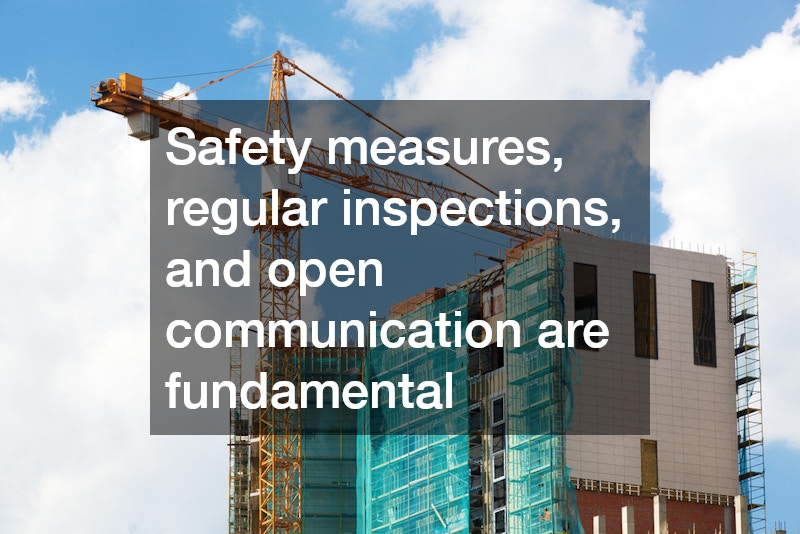In the realm of construction and large-scale industrial projects, cranes are vital pieces of machinery. They play an essential role in lifting heavy materials, assembling structures, and ensuring the smooth workflow of a project. However, while their utility is undeniable, ensuring safety when working with crane businesses is paramount.
Crane companies often operate under stringent industry standards, but oversight remains essential to prevent workplace accidents. Collaborating with these businesses requires a keen understanding of potential risks and insurance compliance to safeguard all parties involved.
Busy project managers must ensure that all aspects related to crane operations, from selection to operation, adhere to the highest safety standards.
As projects grow in scale and complexity, the need for safe crane operations increases. Safety doesn’t merely involve direct operators; it’s also about ensuring that every stakeholder, including project managers and adjoining workers, is in sync with safety protocols. This article provides insight into crucial safety tips when working with crane professionals on large-scale projects.
Choosing the Right Business
Selecting the right crane business is more than just finding a service that fits the budget. It’s vital to choose crane businesses with a proven track record of safety and compliance with industry regulations. These businesses should have transparent operating procedures and verified credentials to ensure they meet all necessary safety standards.
Crane companies with a history of positive client testimonials often have demonstrated their commitment to safety and professional integrity. They embody a culture where rigorous training and safety practices are ingrained in their operational ethos. Engaging such businesses reduces the risk of mishaps and promotes a safe working environment for everyone involved on-site.
Certifications and regulatory compliance are essential factors to consider when evaluating options. They not only confirm the legitimacy of the business but also ensure that the cranes are inspected and maintained according to industry standards. Performing due diligence in selecting a crane business can mitigate many potential risks associated with large-scale projects.
Implementing Safety Protocols
Once a crane business is selected, detailed safety protocols must be established. These protocols should encompass everything from equipment inspection checklists to emergency response strategies. Crane businesses should work cohesively with project teams to develop safety plans tailored to the specific site conditions and project requirements.
Training is a crucial component of these safety protocols. Ensuring that all personnel are well-versed with safety regulations and operational procedures can significantly minimize risks. Regular safety drills and constant communication between crew members and crane operators form the backbone of effective safety practices.
Consistent reviews and updates of the safety protocols are necessary as projects progress and new challenges arise. This proactive approach ensures that both the crane business and the project team remain responsive to potential changes in risk dynamics. By prioritizing and refreshing safety measures, incidents can be effectively prevented on large-scale project sites.
Conducting Regular Inspections
Regular safety inspections are indispensable to maintaining a safe work environment. Crane companies should conduct comprehensive checks before, during, and after every operation to ensure equipment is in top working condition. Such inspections help in identifying wear and tear, potential malfunctions, and compliance with safety protocols.
Involving third-party inspectors can add an additional layer of scrutiny, ensuring unbiased assessments of safety practices. These inspections guarantee that crane businesses adhere to all legal and safety requirements. They operate as a preventive measure against possible workplace hazards that could jeopardize the safety of workers.
Documentation of inspection results is crucial for identifying recurring issues and developing improvement strategies. These records provide valuable insights into regular maintenance needs and facilitate the timely replacement of outdated equipment. Continual assessment through inspections supports long-term safety and operational efficiency on large-scale projects.
Ensuring Proper Communication
Effective communication is pivotal in ensuring safety when working with crane businesses. It facilitates the coordination between different stakeholders, ensuring everyone is aware of their responsibilities and safety measures. Regular meetings and briefings are necessary to address potential issues and reinforce safety strategies.
Modern technology offers advanced tools that can enhance communication between project teams and crane operators. These tools allow real-time updates and rapid response to any emergent situations, enhancing overall project safety. Leveraging such technology can drastically reduce the chances of miscommunication-related accidents.
Clear signage and signals are also vital to effective communication on a project site. Crane professionals should ensure that all personnel understand hand signals, alarms, and other communication methods used during crane operations. By prioritizing robust communication practices, project managers can significantly enhance the safety of large-scale construction projects.
Working with crane businesses on large-scale projects necessitates a strong commitment to safety. From selecting the right business to ensuring ongoing communication, each step plays a critical role in fostering a safe working environment. Emphasizing safety doesn’t only protect lives but also ensures the successful completion of ambitious projects.
An unwavering focus on safety not only protects workers but also enhances productivity by reducing unplanned downtimes due to accidents. Crane businesses that uphold rigorous safety standards and supportive project teams are integral to constructing reliable and efficient infrastructures. By working collaboratively, project teams can achieve both operational success and safety excellence.
Adopting robust safety measures, regular inspections, and maintaining open lines of communication are fundamental to minimizing risks when working with crane businesses. These practices ensure that all aspects of crane operations contribute positively to project outcomes, highlighting the importance of safety in achieving construction goals. It is through such diligence and cooperation that large-scale project undertakings can be conducted safely and efficiently.




